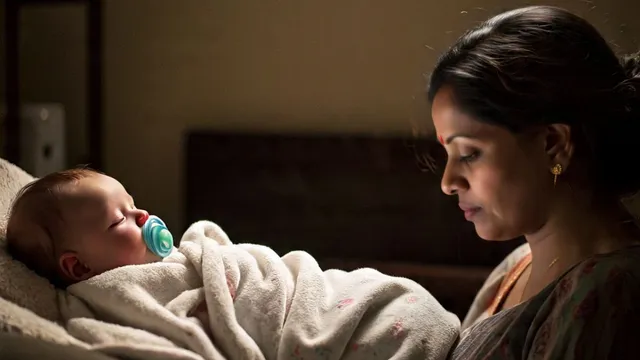- By Priyanka Koul
- Tue, 09 Sep 2025 11:03 AM (IST)
- Source:JND
In a deeply disturbing incident, a 23-year-old woman in Moradabad, reportedly suffering from postpartum psychosis, placed her 15-day-old baby inside a refrigerator before going to sleep. The infant was rescued by his grandmother, who heard his cries. The shocking act has alarmed the local community and reignited discussions around postpartum mental health issues.
Family members said the young mother lived with her husband, a brass artisan, and her in-laws in Jabbar Colony, Moradabad. On September 5, after the baby became restless, she reportedly took him to the kitchen and put him inside the fridge. She then returned to her room and fell asleep. A short while later, the child’s cries alerted the grandmother, who traced the sound to the fridge and pulled the infant out. The baby was taken to a doctor, who confirmed he had not sustained any injuries, according to News18.
When questioned by her family, the woman responded without emotion, “He was not sleeping, so I kept him in the fridge.” Her reaction left the family stunned. At first, they suspected a supernatural cause and took her to a local tantrik for rituals. When that didn’t help, a relative recommended psychiatric evaluation.
She was subsequently admitted for psychiatric care, where doctors diagnosed her with postpartum psychosis, a rare but serious mental illness that can appear after childbirth.
Mental Health After Child Birth
Mental health experts say that postpartum disorders can range from mild to severe. Many new mothers experience the “baby blues,” which include mood swings and irritability that typically resolve within two weeks. However, some women go on to develop postpartum depression, marked by persistent low mood, anxiety, and detachment from the baby.
In more severe cases such as the one in Moradabad the condition progresses to postpartum psychosis, where the mother may lose touch with reality. Symptoms often include hallucinations, delusions, confusion, and poor judgment, creating serious risks for both the mother and the child.
The World Health Organization (WHO) notes that around 20 per cent of women in developing nations experience postpartum depression. Although postpartum psychosis is rare affecting just 1 to 2 women per 1,000 births—postpartum depression is much more common.
ALSO READ: Nepal Government Lifts Ban On Social Media After 19 Killed, 250 Injured In Deadly Protest
According to a study in the National Library of Medicine, India has a 22 per cent prevalence rate for postpartum depression, yet awareness of such conditions remains low. In many households, these symptoms are misunderstood or dismissed, sometimes attributed to “evil spirits.”
In the Moradabad case, too, the family initially opted for spiritual remedies before eventually seeking professional medical help.

